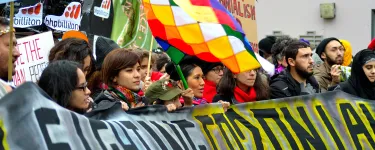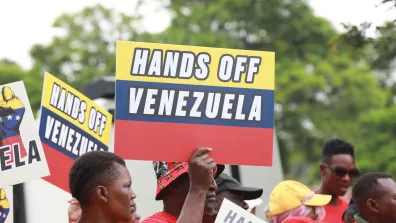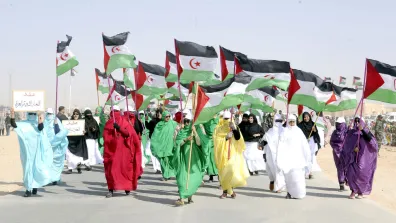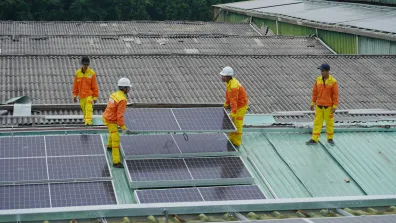Injustice and conflict in the Paris climate deal

A deal may have been done on climate change in Paris last week, but once again rich countries have favoured big business and failed the poorest in society. This reflects a political refusal to protect the rights and needs of people and safeguard the resources they rely on. It will intensify conflict, poverty and injustice.
The new climate deal, which starts in 2020, will not deliver what is needed to fend off dangerous levels of global warming and keep us safe. Quite simply, the ‘efforts to limit’ warming to 1.5 degrees lack the urgency required to tackle the greatest threat facing humanity.
It started badly: a climate summit sponsored by fossil fuel companies and leaked documents revealed an EU block not keen on discussing anything that may be seen to restrict trade. It was doomed from the start.
Targets, other than voluntary national ones, have been removed in the final text and vital concepts of reparation and compensation for those affected already by climate change but not responsible for it – called Loss and Damage – have been weakened.
This deal is unacceptable and communities are rightly angry that the negotiations failed to deliver fair outcomes. Yet the negotiators seem to be patting themselves on the back.
System change not climate change has long been the call of War on Want, and is more urgent than ever.
Injustice and climate change
Poverty is political and in reality climate change is no different. Inadequate climate action and climate scepticism are linked to the political influence and power of the fossil fuel industry.
Directly, climate change is responsible for considerable and growing injustice – as can be seen in the Intergovernmental Panel on Climate Change reports which highlight the future impact on poverty, food supply, access to water and land.
Yet millions of people in the global south are already facing the reality of more intense and frequent extreme weather events forcing them from their homes, displacing whole communities, destroying crops and causing major food crises. Climate refugees are a fact recognised by the UNHCR.
This Paris deal will not deliver for those hit first and worst by climate change, its timetable is too slow, and the decisions being made about how to tackle climate change will exacerbate the injustice.
Climate change and conflict
During the Paris summit a number of politicians commented on the link between climate change and conflict. They may find it convenient to talk about the climate threat to conflict rather than their policies which cause wars and their promotion of the arms trade.
But whilst there are many root causes of war, independent analysis shows the growing significance of climate change in some recent conflicts.
Climate change can be described as a ‘structural threat’. Syria is a case in point. Research carried out at Columbia University in New York suggests an explicit link between the conflict and climate change which intensified the worst-ever drought in the region. This helped to push the country into civil war by destroying agriculture and forcing an exodus to cities already straining from poverty, an influx of refugees from war-torn Iraq next door and poor government.
The authors recognise the limits to such analyses noting "What we’re trying to point out is that climate is one of the critical factors [that] affect how things escalate, and if they escalate to the point of violence."
It is important to understand and act on the political causes of war and conflict but we can no longer ignore climate change as a contributing factor to the violence and bloodshed. The obsession with wars (and arms sales) is as powerful as the obsession with oil and we need to tackle both.
Common factors to both are the corporations which work hard to dilute global climate action but which also have a huge impact on conflict and poverty at a local level.
Fossil fuel extraction and large scale bioenergy production – a commercially attractive but false climate solution - can severely hurt communities and create local conflict and oppression. Oil extraction in Colombia is one example and the land grab to produce biofuels is another.
Breaking the fossil fuel grip
The certainty among scientists that climate change is caused by humans is the same degree of certainty that smoking causes lung cancer. While politicians are now well aware of this, they remain firmly in the pockets of big business – economically and ideologically – when it comes to doing anything meaningful about it.
When those businesses are based on depleting resources and creating pollution – including fossil fuels and extractives – that influence is causing serious policy failure. The many billions in subsidies to fund fossil fuels is a major part of the problem.
This money skews the energy market and could be far better used to support people forced from their homes by persistent flooding or creeping deserts, and finance adaptation and the transition to a fossil free world.
Yet the UK government is providing new subsidies to fossil fuels and taking them away from renewables. The EU push for a major US-EU trade agreement - TTIP -will make curbing dirty fuel production through regulation impossible.
Another world is possible
For two weeks, the streets of Paris were filled with people believing that another world is possible. Demonstrations were creative and inclusive and powerful despite the police crackdown following the Paris attacks.
Joining with global movements against corporate control and climate change will generate the kind of pressure needed for a democratic process of transformation to create a safe space for us all to live.
Such a transformation will mean dramatic shifts in the way we consume stuff to reduce pressure on land, soil, forests, water – the key resources we need to protect to avoid conflict and poverty.
It will also mean a huge shift in wealth distribution and major system change to secure a just and safer world, free from both the threat of runaway climate chaos but also free from power structures which ferment conflict and allow polluting, unfair systems to dominate.


